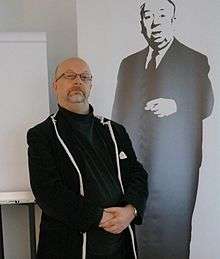Ip Wischin
| Ip Wischin | |
|---|---|
 | |
| Born |
Ippolit Wischinsky April 20, 1963 Ekibastuz |
| Occupation | Director, screenwriter, consultant, composer |
Ippolit Wischinsky (born April 20, 1963), known as Ip Wischin, is a Russian/Austrian dramaturgist, director, screenwriter, composer and business consultant, whose main work is about the basic principles of film dramaturgy.
Career
Wischin started filmmaking in his early teens, shooting Shorts and experimental movies on Super 8. Moving to New York in 1981, he studied directing, producing and editing at the School of Visual Arts and later assisted Miloš Forman (known for movies like One Flew Over the Cuckoo's Nest and Amadeus) at Columbia University.
After returning to Austria in 1985, he started working on Totentriptychon, a variation on Fritz Lang's Destiny - Der müde Tod, set in an endtime dystopia. At the same time, he worked as editor and writer for the ORF - Austrian Broadcasting and the Bundesamt für Eich- und Vermessungswesen or BEV (German for Federal Office of Metrology and Surveying).
Shortly after being ordained as Zen Buddhist(Jukai), he was approached by Michael Glawogger to work on Movies in the Mind(Kino im Kopf), an episodic film project, for which Wischin wrote the episode "Die Momolosse". He also composed the music and played the lead character.
In 1996 he moved to theater, where he got more into acting. He wrote several well known pieces which were staged worldwide. Among them were Die fabelhafte Welt des Sigmund Freud and Amerika(Der Verschollene), a piece by Franz Kafka, which Wischin translated and adapted for the stage; he also played one of the leads during a tour in the USA.[1] Art Director of the Pygmalion Theater in Vienna from 1996 to 2004, Wischin was heavily influenced by the theater's founder and drama teacher Geirun Tino, who directed many of Wischin's plays.
Awards
Ip Wischin received an award at the Wiener Bezirksfestwochen as best actor, for his role as Wladimir in Samuel Beckett's Waiting for Godot.
Teaching
Since 2006 Wischin teaches Film Dramaturgy, a non-formulaic approach to creating stories, in Vienna, Hollywood[2] and all over the world. The same basic principles are also used in a system created by Ip Wischin and Marc Miletich, called Contextual Conflict Resolution (presented as "Ginger Paradigm" at the Vienna TEDx Talks 2013).[3] It proves especially efficient in conjunction with economic paradigm changes and the detachment of big corporations strict hierarchies, from the modern social networks. Film Dramaturgy offers a range of communicative processes and analytical tools to resolve these issues .[4]
References
- ↑ See, Rich (2003) CurtainUp DC Review of America | Arts. The Internet Theater Magazine of Reviews, Features, Annotated Listings. Retrieved on July 16, 2014.
- ↑ Supri, Dorothy (January 15, 2013) Film Dramaturgy Lecture Roundup | Arts. The International Student Film Festival Hollywood. Retrieved on July 16, 2014.
- ↑ Ginger Paradigm; TEDx Talks Vienna, 2013 on YouTube. Retrieved on July 16, 2014.
- ↑ Wirtschaftsdramaturgie. Sonovista.com. Retrieved on July 16, 2014.